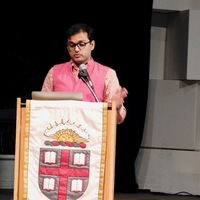
Subrata Mitra
Subrata Mitra, Ph.D. (Rochester) is an emeritus professor of Political Science, Heidelberg University. Comparative Politics, South Asian area studies, Elections and democratic consolidation, citizenship and rational choice are among his main research interests. His 'Governance by Stealth: The Ministry of Home Affairs and Making of the Indian State' is forthcoming from Oxford University Press.
less
Related Authors
Wolf Gruner
University of Southern California
Rolf Strootman
Utrecht University
Zulfiqar Ali Kalhoro
Pakistan Institute of Development Economics, Islamabad
Dhritiman Chakraborty
Gour College
Jesse Knutson
University of Hawaii at Manoa
Lubomír Ondračka
University of Oxford
Cuadernos de Literatura
Pontificia Universidad Javeriana
Adrián Muñoz
El Colegio de México
Mohammad Sajjad
Aligarh Muslim University
Yves Porter
Aix-Marseille University










Uploads
Papers by Subrata Mitra
nation based on the core values of Hindu nationalism is
the main ideological plank of the Bharatiya Janata Party.
However, in contrast with the general elections of 2014
and 2019, this electoral strategy fell short of the
expected electoral dividend in 2024. The empirical
analysis of pre- and post-poll survey data explains why.
The electoral competition took place between two
“polarising elites”—the National Democratic Alliance
and the Indian National Developmental Inclusive
Alliance whose manifestos show radically different
visions of the Indian nation—facing a “harmonising”
public. This evidence suggests that the BJP will need to
rethink its cultural/electoral agenda in order to sustain its
electoral momentum. Instead of exogenously enforced
nation-building, the party needs to think in terms of
nationisation which entails the blending together of the
values, rituals and sacred beliefs of the moral
communities that constitute the diverse Indian society.
The paper suggests six enabling conditions of
nationisation, which might go some way to solve the
strategic challenge that BJP is faced with, post 2024.
The
nation based on the core values of Hindu nationalism is
the main ideological plank of the Bharatiya Janata Party.
However, in contrast with the general elections of 2014
and 2019, this electoral strategy fell short of the
expected electoral dividend in 2024. The empirical
analysis of pre- and post-poll survey data explains why.
The electoral competition took place between two
“polarising elites”—the National Democratic Alliance
and the Indian National Developmental Inclusive
Alliance whose manifestos show radically different
visions of the Indian nation—facing a “harmonising”
public. This evidence suggests that the BJP will need to
rethink its cultural/electoral agenda in order to sustain its
electoral momentum. Instead of exogenously enforced
nation-building, the party needs to think in terms of
nationisation which entails the blending together of the
values, rituals and sacred beliefs of the moral
communities that constitute the diverse Indian society.
The paper suggests six enabling conditions of
nationisation, which might go some way to solve the
strategic challenge that BJP is faced with, post 2024.
The